ANNOUNCING MY NEW BOOK: A PERFECT GIFT BOOK FOR COLLEGE GRADUATES:
Serious Dreams: Bold Ideas for the Rest of Your Life (Square Halo Books) $13.99
There are phrases that keep coming to mind, as I sit here, fingers poised over the keyboard, phrases that we all know that should guide decent conversation in the polite ways of appropriate humility. One ought not “toot your own horn” or “pat yourself on the back”, let alone “sing your own praises.”
I don’t know quite how to get around this, though, as today, this is exactly my job.
Serious Dreams: Bold Ideas for the Rest of Your Life, the book that some of you have heard I’ve been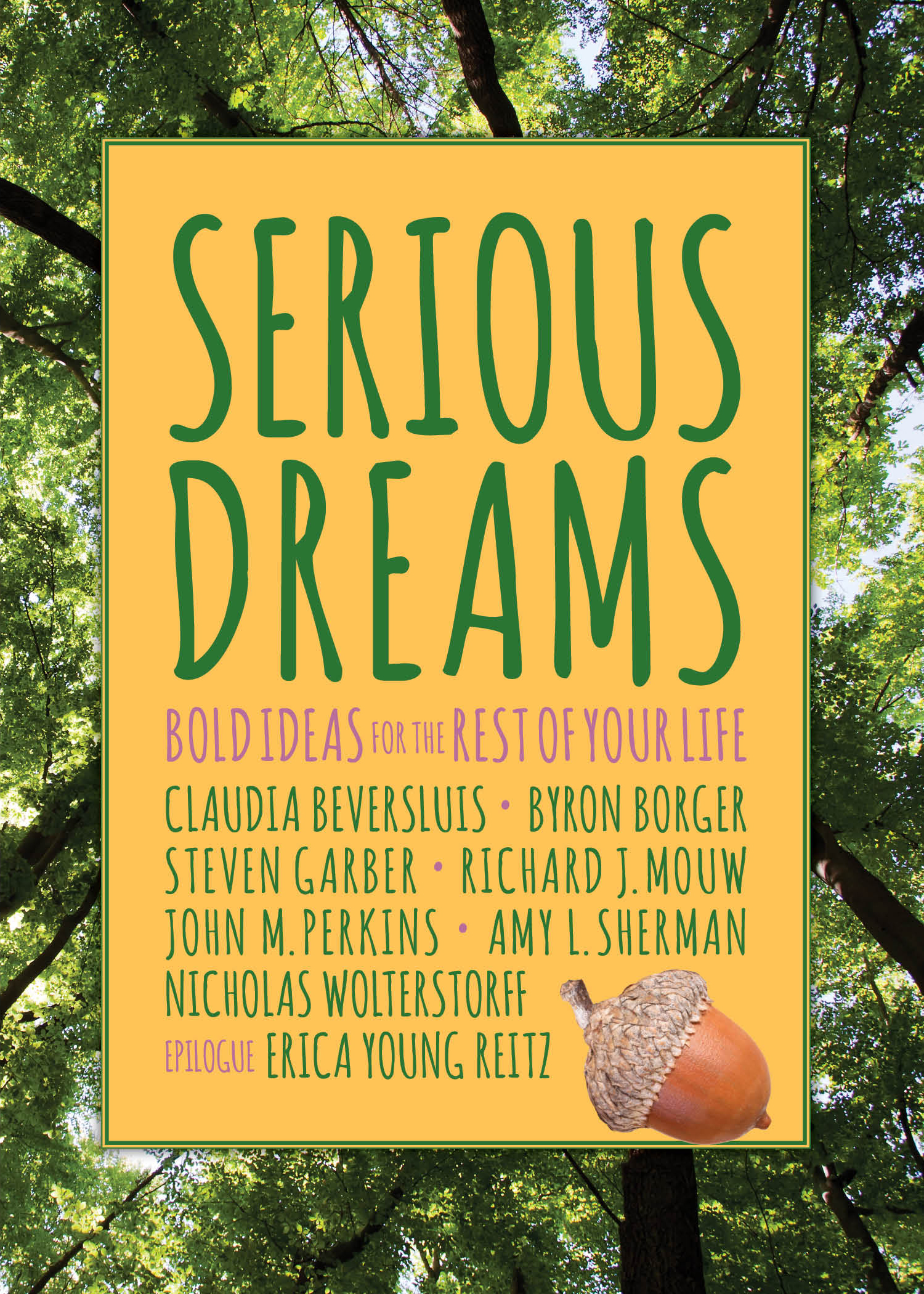 working on this past year, was just released by the publisher this week. Obviously, we just had to tell you!
working on this past year, was just released by the publisher this week. Obviously, we just had to tell you!
Given that it was pretty much my idea — yep, it’s my little baby — and given that the publisher is a respected but small, indie press without a huge reach into the marketplace, and, given, too, that it was rushed to publication quickly, as I hoped, without much of a marketing plan, I guess it is evident that it is my job to let you know about it now.
Did I say this really is my baby? That Beth and I have been significantly involved with Square Halo Books to get this thing out their doors? That I think it is pretty amazing, even if it sounds impolite for me to say so? I’m blushing a bit, but I’m so excited to tell you all about it.
If ever there was a time when our dear BookNotes readers and Hearts & Minds fan base needs to know about something (something that they most likely won’t hear about anywhere else) this is it. So forgive me as I review my own work. It’s a little weird, I know, but bear with me: despite obvious bias and self-interest, I really do think you will want to know about this. Dare I say you need to know about this?
And that we need your help in spreading the news about this book for young adults, recent college grads, especially, inspiring them to live well, taking up serious dreams of God’s Kingdom coming.
 The shortest version of the backstory is that I was given the great privilege of delivering the commencement address for the Graduate School and Adult Learners at Geneva College in Beaver Falls, Pennsylvania, last spring. It was a thrilling event for Beth and me; associates there offered great support, the trustees awarded me an honorary doctorate, and even some out of state friends arrived to help celebrate. In that speech I talked a bit about the unique heritage of this Reformed Presbyterian college, its good legacy, their current conversations about the integration of faith and learning for the common good, and the future for recent grads, helping them
The shortest version of the backstory is that I was given the great privilege of delivering the commencement address for the Graduate School and Adult Learners at Geneva College in Beaver Falls, Pennsylvania, last spring. It was a thrilling event for Beth and me; associates there offered great support, the trustees awarded me an honorary doctorate, and even some out of state friends arrived to help celebrate. In that speech I talked a bit about the unique heritage of this Reformed Presbyterian college, its good legacy, their current conversations about the integration of faith and learning for the common good, and the future for recent grads, helping them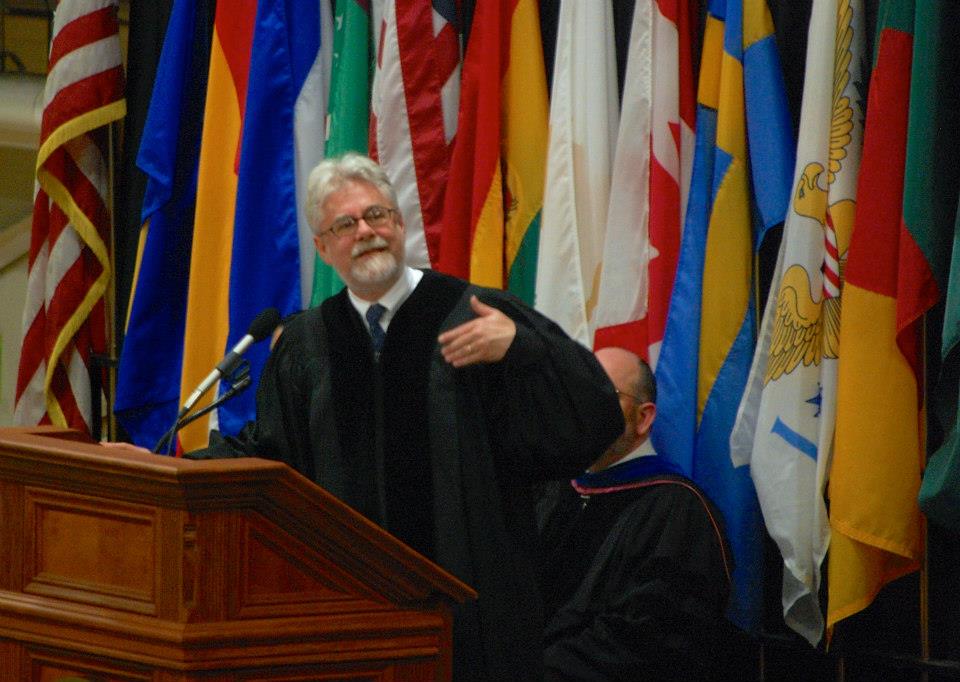
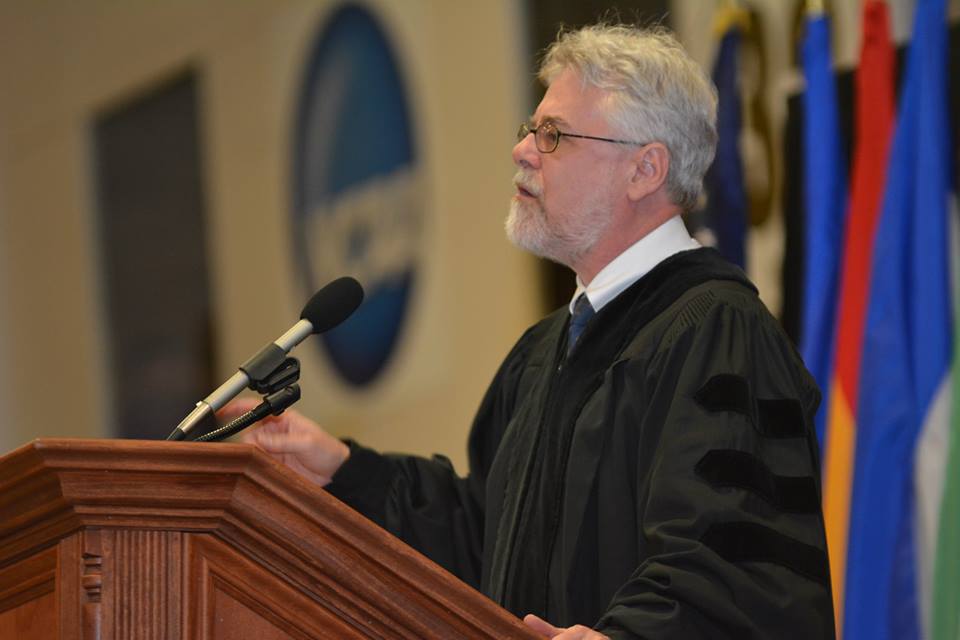 imagine the complex tasks of stepping into their vocations in the world, for the life of the world. I preached on a few favorite passages, told a few stories, and cried out to God and the gathered community, hoping that these talented young adults would help advance Christ’s Kingdom, especially in their various careers, jobs, workplaces. It got a pretty good response, for which I was humbled and grateful. A number of people asked if I might print it up, and we considered briefly doing a little booklet to share with those who had wanted to read it. Borger getting a free doctorate was quite the news for a bit — ha, ha – and we wanted to honor those who wanted to read my remarks.
imagine the complex tasks of stepping into their vocations in the world, for the life of the world. I preached on a few favorite passages, told a few stories, and cried out to God and the gathered community, hoping that these talented young adults would help advance Christ’s Kingdom, especially in their various careers, jobs, workplaces. It got a pretty good response, for which I was humbled and grateful. A number of people asked if I might print it up, and we considered briefly doing a little booklet to share with those who had wanted to read it. Borger getting a free doctorate was quite the news for a bit — ha, ha – and we wanted to honor those who wanted to read my remarks.
 A week or so later, I watched the commencement address at Calvin College in Grand Rapids, one delivered by then-Provost Dr. Claudia Beverslius, who built her marvelous speech around a beloved Wendell Berry poem, a funeral poem, actually. Mr. Berry has visited their campus on more than one occasion and it was more than appropriate to use his work, it was genius. With tears running down my cheeks in front of the live streaming video on Beth’s computer, I commented that that was a speech that deserved to be widely read.
A week or so later, I watched the commencement address at Calvin College in Grand Rapids, one delivered by then-Provost Dr. Claudia Beverslius, who built her marvelous speech around a beloved Wendell Berry poem, a funeral poem, actually. Mr. Berry has visited their campus on more than one occasion and it was more than appropriate to use his work, it was genius. With tears running down my cheeks in front of the live streaming video on Beth’s computer, I commented that that was a speech that deserved to be widely read.
And so I set out to find other friends of mine or authors I respected who had given graduation speeches for evangelical Christian colleges, speeches I could acquire easily, that had not been published in a book before, and that cohered around a common theme – taking up what Steve Garber calls “visions of vocation” and living out the implications of the gospel of the Kingdom in all of life, for the life of the world. Not a few speeches these days use the language of calling, finding purpose and meaning, making a difference, but I did not want any that were merely inspirational, without Biblical substance to inform the meaning of these grand rhetorical calls, and I wanted reflections that did not overstate the call to be radical, as if we are all called only to be revolutionaries changing the world, with unrealistic bluster. I wanted balance, substance, and talks that were beautifully crafted, well done, words that would last, bread for the journey as young adults make their way into the marketplace.
They didn’t need to be in the same theological tradition, exactly, but I wanted them to hold together, offering a certain sort of worldview and embodied practices, in the world, but not of it, for the sake of God’s glory and our neighbors good. And I found some great ones.
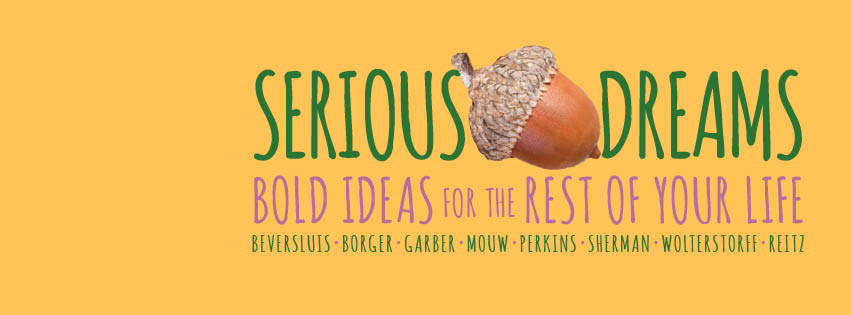 Serious Dreams: Big Ideas… includes seven great messages and they all translate well from the spoken word format to the printed page. (I will write a bit about the adventure of editing these manuscripts, and why we left most of the talks mostly unedited, soon.) I think this small. compact sized book is not only a great gift for a graduating college young adult, but for anyone wanting to be reminded of the big picture of our call to follow Christ in all areas of life, living missionally for the reign of God, even in our work and careers.
Serious Dreams: Big Ideas… includes seven great messages and they all translate well from the spoken word format to the printed page. (I will write a bit about the adventure of editing these manuscripts, and why we left most of the talks mostly unedited, soon.) I think this small. compact sized book is not only a great gift for a graduating college young adult, but for anyone wanting to be reminded of the big picture of our call to follow Christ in all areas of life, living missionally for the reign of God, even in our work and careers.
I begin the book with a long, opening introduction that, we think, helps frame the ideas of the speeches. I admit that I like the breathy rhetoric of these upbeat messages, designed to inspire young professionals to enter the worlds of work and see their future destinations as venues for the redeeming work of God. I like the approach expressed in some of them, how our own life stories make most sense in light of God’s redemptive Story. My own speech in the book is pretty breathy and earnest about such things, maybe a bit fiery, even. But much of my introduction is a gentle reminder not to take these motivational sermons to mean that we have to “go far” or “make something of ourselves” as “world changers” or that we have to do big things to “transform the culture.” No — we can start small, live locally, be faithful even in baby steps as we live into this story, gain a sense of place, learn our craft, earn the right to be heard.
 In that introductory chapter, I mention authors like Wendell Berry and Eugene Peterson who remind us to find God in the down-to-Earth and mundane, even the rural and seemingly insignificant. Granted, some may be called to pretty glitzy careers in high-rise offices exploring remarkable careers, but most of us are not. I cite books like Jonathan Wilson Hartgrove’s The Wisdom of Stability: Rooting Faith in a Mobile Culture. Although most of the speakers do suggest it, I wanted to be clear: young adults transitioning out of college need both a big, transforming vision and a whole lot of patience; we need to be eager to make a difference in the culture, yes, but we also need good friends, a faithful church, good art, healthy food, helpful stores, enriching hobbies, maybe a bookseller friend or two, living slowly into what I explain as “common graces for the common good.” It is good to be involved in normal life, establishing sacred rhythms and living well, in ways that are not particularly extraordinary.
In that introductory chapter, I mention authors like Wendell Berry and Eugene Peterson who remind us to find God in the down-to-Earth and mundane, even the rural and seemingly insignificant. Granted, some may be called to pretty glitzy careers in high-rise offices exploring remarkable careers, but most of us are not. I cite books like Jonathan Wilson Hartgrove’s The Wisdom of Stability: Rooting Faith in a Mobile Culture. Although most of the speakers do suggest it, I wanted to be clear: young adults transitioning out of college need both a big, transforming vision and a whole lot of patience; we need to be eager to make a difference in the culture, yes, but we also need good friends, a faithful church, good art, healthy food, helpful stores, enriching hobbies, maybe a bookseller friend or two, living slowly into what I explain as “common graces for the common good.” It is good to be involved in normal life, establishing sacred rhythms and living well, in ways that are not particularly extraordinary.
I do not want to scare you away, but I also say in this framing introduction that we must also be prepared to suffer. I mention Henri Nouwen’s good phrase, saying we can be “wounded healers” and tell an Anne Lamotte story about hard times. I note that Nicholas Wolterstorff’s spectacular speech is about having “two eyes” – one to see what needs to be done, a technical eye for skills and competence and excellence, and the other with which to shed tears. I think this is liberating, good stuff, and it helps readers realize that although most of these speeches are motivational and encouraging, we do have to be prepared for the hardships of this life. I say it better in the book, but wanted you to know some of the themes of my opening chapter. It is called “Live Well, Do Good, Be True.”
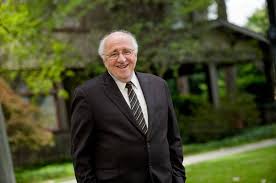 Richard Mouw‘s is the first real chapter. He a master of the short speech (in fact, he has a book of very short speeches published by Eerdmans that he compiled during his years at President of Fuller Theological Seminary, called Praying at Burger King. It’s great!) This commencement address, entitled “What It’s All About” was given last year near us here at Messiah College. It is a bit longer than those short ones, but it is concise and powerful. He starts with a splendid joke, talks about the significance of having been a collegiate learner, and reminds these soon-to-be-graduates of the importance of uniquely Christian scholarship, encouraging them to keep their minds sharp, and too look for ways to honor Christ even in the life of the mind. He tells a few moving stories about the clarity we need about the first things of the gospel, about the courage that is needed to live out faith in our complicated world. He ends with a rousing Bible reading; it is an inspiring ending of a very good chapter. I must say it is a real honor to have Rich in this little book; he is one of our favorite writers and thinkers these days and it’s a great lead chapter. His latest book, by the way, is a lovely little volume about some of these same themes and is entitled Called to the Life of the Mind.
Richard Mouw‘s is the first real chapter. He a master of the short speech (in fact, he has a book of very short speeches published by Eerdmans that he compiled during his years at President of Fuller Theological Seminary, called Praying at Burger King. It’s great!) This commencement address, entitled “What It’s All About” was given last year near us here at Messiah College. It is a bit longer than those short ones, but it is concise and powerful. He starts with a splendid joke, talks about the significance of having been a collegiate learner, and reminds these soon-to-be-graduates of the importance of uniquely Christian scholarship, encouraging them to keep their minds sharp, and too look for ways to honor Christ even in the life of the mind. He tells a few moving stories about the clarity we need about the first things of the gospel, about the courage that is needed to live out faith in our complicated world. He ends with a rousing Bible reading; it is an inspiring ending of a very good chapter. I must say it is a real honor to have Rich in this little book; he is one of our favorite writers and thinkers these days and it’s a great lead chapter. His latest book, by the way, is a lovely little volume about some of these same themes and is entitled Called to the Life of the Mind.
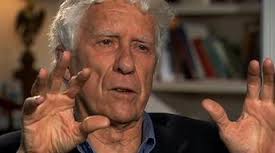 Mouw’s old friend, himself a renowned political philosopher and renowned scholar, Nicholas Wolterstorff, Professor Emeritus at Yale, has one of the most brilliantly conceived pieces in the book. Nick explains as a philosopher can, the nuances of what good Christian thinking entails, and he, like Mouw, extols the good learning skills acquired in (Christian) higher education, reminding the young adults to continue to think well, calling them to challenge the ways things are, probing the deeper meaning of things they encounter, even in their future workplaces and institutions. But the heart of his talk comes from story about an obstetrician who once advised health care providers among those who experience the death of a newborn to have “two eyes – one to watch the IV, the other to weep with the bereaved parents.” And from there, Wolterstorff asks what it would mean for businesspeople or teachers or lawyers or engineers or workers in any career to have two eyes, seeing competence and compassion, skill-sets and excellence as well as the ability to weep with those who weep. In fact, he suggested, if one is attuned to the suffering in any given arena of life, it is more likely that one will want to use her skills to bring reform and change in their profession so that those who are hurting might see justice. (And, conversely, even if a young professional is truly skilled, without the eye that sheds tears, she may not realize what might be wrong in the place she works, and her skill becomes mere technical competence, not Christian service.) Over and over, the famed professor shows that we need two eyes. That is, he explains with great clarity and beautifully crisp sentences why we need “head and heart” – two eyes. It is an amazing speech and well worth pondering, even worth the price of the book for us all.
Mouw’s old friend, himself a renowned political philosopher and renowned scholar, Nicholas Wolterstorff, Professor Emeritus at Yale, has one of the most brilliantly conceived pieces in the book. Nick explains as a philosopher can, the nuances of what good Christian thinking entails, and he, like Mouw, extols the good learning skills acquired in (Christian) higher education, reminding the young adults to continue to think well, calling them to challenge the ways things are, probing the deeper meaning of things they encounter, even in their future workplaces and institutions. But the heart of his talk comes from story about an obstetrician who once advised health care providers among those who experience the death of a newborn to have “two eyes – one to watch the IV, the other to weep with the bereaved parents.” And from there, Wolterstorff asks what it would mean for businesspeople or teachers or lawyers or engineers or workers in any career to have two eyes, seeing competence and compassion, skill-sets and excellence as well as the ability to weep with those who weep. In fact, he suggested, if one is attuned to the suffering in any given arena of life, it is more likely that one will want to use her skills to bring reform and change in their profession so that those who are hurting might see justice. (And, conversely, even if a young professional is truly skilled, without the eye that sheds tears, she may not realize what might be wrong in the place she works, and her skill becomes mere technical competence, not Christian service.) Over and over, the famed professor shows that we need two eyes. That is, he explains with great clarity and beautifully crisp sentences why we need “head and heart” – two eyes. It is an amazing speech and well worth pondering, even worth the price of the book for us all.
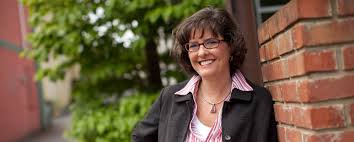 The third chapter is another brilliant contribution, a concise and clear sermon on one passage of the Bible that will open up new vistas of understanding, create hope and energy for seeing one’s life and work as a ministry for the common good, in the public square. Dr. Amy Sherman delivered this talk called “Rejoicing Your Community” (inspired by Proverbs 11:10) at Malone University in Ohio, and, again, I would be glad to give this speech to anyone wanting to deepen their understanding of what we mean by stewarding one’s career in ways that serve others. Few have thought very explicitly about this, let alone heard a
The third chapter is another brilliant contribution, a concise and clear sermon on one passage of the Bible that will open up new vistas of understanding, create hope and energy for seeing one’s life and work as a ministry for the common good, in the public square. Dr. Amy Sherman delivered this talk called “Rejoicing Your Community” (inspired by Proverbs 11:10) at Malone University in Ohio, and, again, I would be glad to give this speech to anyone wanting to deepen their understanding of what we mean by stewarding one’s career in ways that serve others. Few have thought very explicitly about this, let alone heard a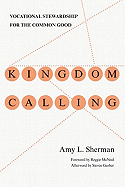 whole talk about it, but the text which Dr. Sherman explores says that the whole city will rejoice when “the righteous prosper.” Rather than producing resentment (which would be understandable, the have-nots frustrated with the haves, so to speak) those who perhaps are not prospering will be gladly rejoicing if God’s righteous ones are successful in ways that cause the healthy flourishing for all. That is, the city rejoices because, precisely, the tsaddiqim are not in it for themselves. Their prosperity apparently is a blessing to others, and develops because of, and is bound up with, the good of the city in which they live.
whole talk about it, but the text which Dr. Sherman explores says that the whole city will rejoice when “the righteous prosper.” Rather than producing resentment (which would be understandable, the have-nots frustrated with the haves, so to speak) those who perhaps are not prospering will be gladly rejoicing if God’s righteous ones are successful in ways that cause the healthy flourishing for all. That is, the city rejoices because, precisely, the tsaddiqim are not in it for themselves. Their prosperity apparently is a blessing to others, and develops because of, and is bound up with, the good of the city in which they live.
Her examples and questions about how to leverage one’s professional skills and passions for the common good is exactly the kind of speech (she lifts up as examples a few Malone alum who are doing good work) I wanted to find for this little volume, and we are glad Amy graced us with her good manuscript. For those wanting a fuller explication of this good idea, do see her significant Kingdom Calling: Vocational Stewardship for the Common Good (InterVarsity Press.)
 The next chapter is the one I have mentioned by Dr. Claudia Berversluis, the one that draws on a poem by Wendell Berry, “The Memory in the Seed.” Not only does she artfully use his insight about the relationship of the past to the future – seeds have been planted in the stuff learned at college, in the reading and learning in the classroom and in other places and ways, too – and they will be paid forward into the future. Perhaps it is because I have a daughter at Calvin College, and have very dear friends who work there, but this wonderful talk was the one that inspired me to do this book, and it is a very, very, good address. I have read it a dozen times, now, and do not tire of its inspiration, feeling her care for the graduating students and her hopeful confidence in the scope and broad vision of God’s Kingdom coming, even in hard times. I commend it to you, I really do.
The next chapter is the one I have mentioned by Dr. Claudia Berversluis, the one that draws on a poem by Wendell Berry, “The Memory in the Seed.” Not only does she artfully use his insight about the relationship of the past to the future – seeds have been planted in the stuff learned at college, in the reading and learning in the classroom and in other places and ways, too – and they will be paid forward into the future. Perhaps it is because I have a daughter at Calvin College, and have very dear friends who work there, but this wonderful talk was the one that inspired me to do this book, and it is a very, very, good address. I have read it a dozen times, now, and do not tire of its inspiration, feeling her care for the graduating students and her hopeful confidence in the scope and broad vision of God’s Kingdom coming, even in hard times. I commend it to you, I really do.
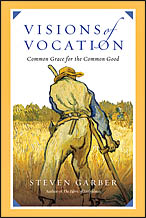
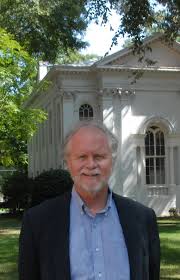 I perhaps don’t need to say too much about the fifth chapter other than to say it is an elegant rendering by Steve Garber, a dear friend and respected leader, especially on issues of the relationship of faith and work. Again, when I felt led to do this project, I knew I would insist on having his work represented; a book like this just had to have him in it, and we are grateful for his eager support. You may know his good efforts through his Washington Institute on Faith, Vocation and Culture. Perhaps you will recall his extraordinary book about living in the post-college years, Fabric of Faithfulness: Weaving Together Belief and Behavior, which was a much-discussed book a few years back, and still very, very worth of your attention. I hope you know his newer, award- winning book Visions of Vocation: Common Grace for the Common Good. In this talk – which was delivered last year to the graduating class of seminarians at Covenant Seminary in St. Louis, Missouri – Steve explores the notion that covenant could be an essential insight to understanding the nature of the world God has made, which he calls, sounding almost like Francis Schaeffer, a “covenantal cosmos.” Garber brings Wendell Berry into the conversation, mentions his own work consulting with large corporations and nonprofit ministries to help explore the way a covenantal understanding of knowing the world could bring healing and hope and hints of reformation in these troubled times. By using words like mutuality and responsibility, Steve models an allusive and profound language, and invites his listeners to learn how to speak about solid Biblical truths in ways that that unchurched and unfamiliar might understand and be drawn towards.
I perhaps don’t need to say too much about the fifth chapter other than to say it is an elegant rendering by Steve Garber, a dear friend and respected leader, especially on issues of the relationship of faith and work. Again, when I felt led to do this project, I knew I would insist on having his work represented; a book like this just had to have him in it, and we are grateful for his eager support. You may know his good efforts through his Washington Institute on Faith, Vocation and Culture. Perhaps you will recall his extraordinary book about living in the post-college years, Fabric of Faithfulness: Weaving Together Belief and Behavior, which was a much-discussed book a few years back, and still very, very worth of your attention. I hope you know his newer, award- winning book Visions of Vocation: Common Grace for the Common Good. In this talk – which was delivered last year to the graduating class of seminarians at Covenant Seminary in St. Louis, Missouri – Steve explores the notion that covenant could be an essential insight to understanding the nature of the world God has made, which he calls, sounding almost like Francis Schaeffer, a “covenantal cosmos.” Garber brings Wendell Berry into the conversation, mentions his own work consulting with large corporations and nonprofit ministries to help explore the way a covenantal understanding of knowing the world could bring healing and hope and hints of reformation in these troubled times. By using words like mutuality and responsibility, Steve models an allusive and profound language, and invites his listeners to learn how to speak about solid Biblical truths in ways that that unchurched and unfamiliar might understand and be drawn towards.
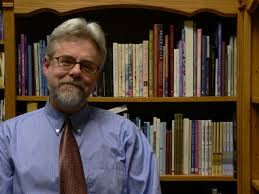 My chapter — Byron K. Borger of Hearts & Minds, for the record — follows Steve’s and if his is the most profound in the book, mine is perhaps the liveliest. As I will explain elsewhere, it was tricky cutting a bit out that perhaps worked in the live setting, but seemed less compelling as read on the printed page. In the original speech I made a number of comments about the college itself, and a former teacher there (Dr. Peter J. Steen) and I took some of those lines out, trimming the wordy text down to a more manageable contribution. (Mine is still the longest in the book — “two speeches for the price of one” one wit quipped. Imagine!) I suppose you know I can get a bit flamboyant at times, and I hope the passion in this talk shines through. Even if I countered it a bit with the calm reminders in the introduction to live small and local, I do share some pretty big ideas in this bold chapter.
My chapter — Byron K. Borger of Hearts & Minds, for the record — follows Steve’s and if his is the most profound in the book, mine is perhaps the liveliest. As I will explain elsewhere, it was tricky cutting a bit out that perhaps worked in the live setting, but seemed less compelling as read on the printed page. In the original speech I made a number of comments about the college itself, and a former teacher there (Dr. Peter J. Steen) and I took some of those lines out, trimming the wordy text down to a more manageable contribution. (Mine is still the longest in the book — “two speeches for the price of one” one wit quipped. Imagine!) I suppose you know I can get a bit flamboyant at times, and I hope the passion in this talk shines through. Even if I countered it a bit with the calm reminders in the introduction to live small and local, I do share some pretty big ideas in this bold chapter.
I wear my heart on my sleeve, there, friends, and I hope you enjoy hearing me share this visionary stuff that I believe with all my being. My message is called “Three Cheers for Sons and Daughters of Issachar” which alludes to the reputation of the group mentioned in 1 Chronicles 12:32 – who “understood the times and knew what God’s people should do.” Oh, if we had more sons and daughters of Issachar, who read the world and read the Word with faithful clarity and big-hearted passion, becoming wise leaders for change, ambassadors of the Kingdom coming, life-long learners willing to critique the culture and offer winsome solutions. Maybe this chapter will stimulate someone some-where to live more robustly for Christ’s ways, prepared even to suffer for His sake, like Issacharians. I’d be eager to hear what you think.
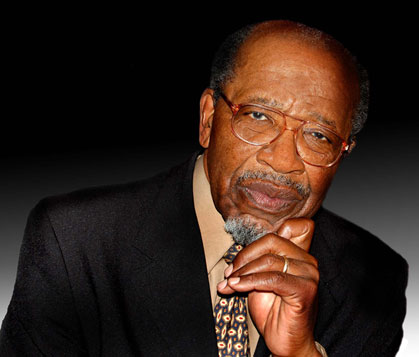 The last commencement speech in the book was given by the famous civil rights leader Dr. John M. Perkins, who preached up a storm at Seattle Pacific University’s graduation ceremony a few years ago. We really wanted to have Dr. Perkins included as he has been a real hero to many of us, and we have crossed paths many a time over the years, most notably at the big Jubilee conference in Pittsburgh. Many of the students affiliated with the CCO who attend Jubilee may know him, and those that do not, certainly should. He is a prolific author and vibrant leader for evangelical faith that is deeply committed to racial reconciliation, social justice, and leadership development, especially among those who are hurting and marginalized. Perkins and his ministry offers a model of radical, prophetic
The last commencement speech in the book was given by the famous civil rights leader Dr. John M. Perkins, who preached up a storm at Seattle Pacific University’s graduation ceremony a few years ago. We really wanted to have Dr. Perkins included as he has been a real hero to many of us, and we have crossed paths many a time over the years, most notably at the big Jubilee conference in Pittsburgh. Many of the students affiliated with the CCO who attend Jubilee may know him, and those that do not, certainly should. He is a prolific author and vibrant leader for evangelical faith that is deeply committed to racial reconciliation, social justice, and leadership development, especially among those who are hurting and marginalized. Perkins and his ministry offers a model of radical, prophetic 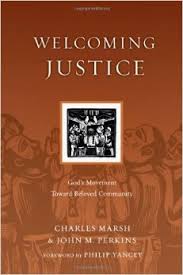 imagination and gospel-centered, evangelical faith.
imagination and gospel-centered, evangelical faith.
This wholistic, but evangelical piety comes out nicely in his speech here, inviting us all to be on “three roads” with Jesus. He tells about the Damascus Road (where Paul was transformed by a saving relationship with Christ), the Emmaus Road (where one walks with Christ, nurturing a spiritual friendship with Him, learning of His ways in the Scriptures) and the Jericho Road – the road of service. Of course, he naturally goes into this “three rs” as well, as a strategy for effective change on that Jericho Road, but the heart of this passionate call to action is based on these three roads. It seemed like a lively enough speech to put at the end of Serious Dreams and it reads well, as a good sermon in the black tradition should.
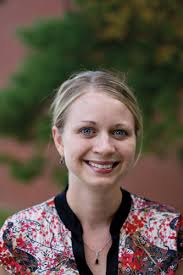 Erica Young Reitz offers a great afterward, an epilogue, really, and it is an integral part of the book. Erica is one of the best campus ministers I know, working for the CCO through a church in State College, PA (home of Penn State.) Year after year she has paid special attention to her young friends who were college seniors, walking with them through that year of transition, and then doing some teaching and services around the post-college experience. (She has done a workshop on this at the Jubilee conference, too, for seniors, to great acclaim.) Erica has a book coming out next year, tentatively titled Life After College (on InterVarsity Press) which tells of her work and offers practical guidance for Christian discipleship in the post-college years, so it is fantastic to have her included here. (The only other book like this, by the way, which we heartily recommend, is by Richard Lamb, called Following Jesus in the “Real World.”) Erica’s Young Reitz’s words at the end of this book gives it a bit more of a practical feel, offering clear guidance that is down to earth and helpful. I trust, also, that it will whet your appetite for her full book when it releases perhaps a year from now.
Erica Young Reitz offers a great afterward, an epilogue, really, and it is an integral part of the book. Erica is one of the best campus ministers I know, working for the CCO through a church in State College, PA (home of Penn State.) Year after year she has paid special attention to her young friends who were college seniors, walking with them through that year of transition, and then doing some teaching and services around the post-college experience. (She has done a workshop on this at the Jubilee conference, too, for seniors, to great acclaim.) Erica has a book coming out next year, tentatively titled Life After College (on InterVarsity Press) which tells of her work and offers practical guidance for Christian discipleship in the post-college years, so it is fantastic to have her included here. (The only other book like this, by the way, which we heartily recommend, is by Richard Lamb, called Following Jesus in the “Real World.”) Erica’s Young Reitz’s words at the end of this book gives it a bit more of a practical feel, offering clear guidance that is down to earth and helpful. I trust, also, that it will whet your appetite for her full book when it releases perhaps a year from now.
So, there it is, my description of the book I compiled and edited and now get to sell, before anywhere else.
I hope you realize that as odd as it is to be tooting my own horn, I am so, so eager to get this little volume launched into the world. We think it is so inspiring, and the authors each of such quality, that you may just want to have it, even if you graduated from college years ago, or perhaps never went to college. The talks are highly motivational, yet, well, serious; the insights, although concise and accessible, are really pretty profound — not the kind of stuff you hear every day. These are learned and smart folks, so the writing is good. As I describe below, it is a handsome, compact volume, with some very nice touches (including a brief reflective question or two at the end of each chapter to help readers process the content.) I’d be grateful and honored if you picked it up from us.
Even if you do want one for yourself — and I hope you do — please do think of this as a great gift for any young adults who have graduated in recent years.
Although these fine speeches were given at Christian colleges the primary intended audience includes anyone who has recently graduated from any kind of school who may appreciate the encouragement and guidance. Perhaps you’d be so kind as to suggest that your church buy a batch so they can honor their college graduates, inviting them to dream Serious Dreams.
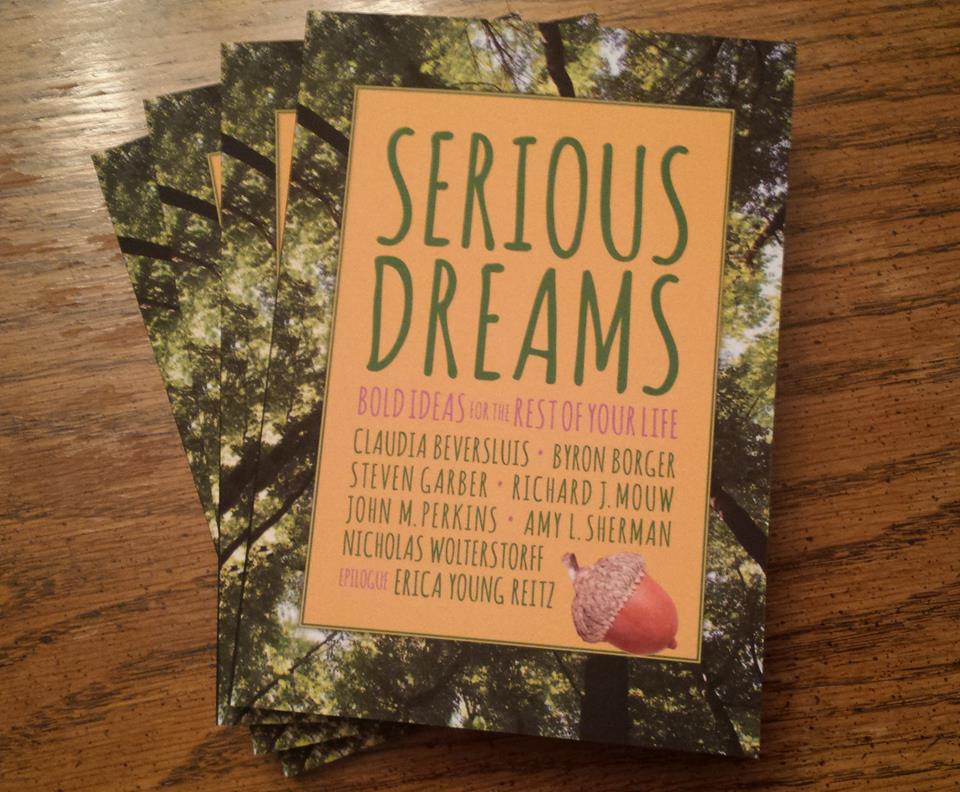
BookNotes
SPECIAL
DISCOUNT
Serious Dreams: Bold Ideas for the Rest of Your Life
regularly $13.95
sale price
20% OFF
$11.16
order here
takes you to the secure Hearts & Minds order form page
just tell us what you want
inquire here
if you have questions or need more information
just ask us what you want to know
Hearts & Minds 234 East Main Street Dallastown, PA 17313 717-246-3333

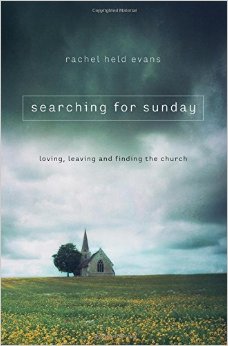 has
has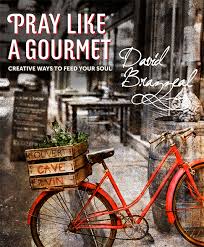 Pray Like a Gourmet: Creative Ways to Feed Your Soul David
Pray Like a Gourmet: Creative Ways to Feed Your Soul David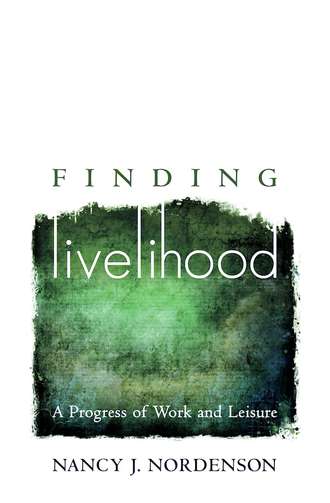 Finding Livelihood: A Progress of Work and Leisure
Finding Livelihood: A Progress of Work and Leisure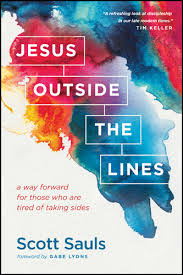 Jesus Outside the Lines: A Way Forward for Those Who Are Tired of Taking Sides
Jesus Outside the Lines: A Way Forward for Those Who Are Tired of Taking Sides 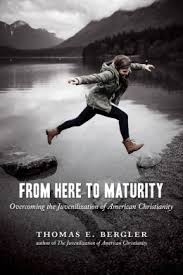 From Here to Maturity: Overcoming the Juvenilization of American
From Here to Maturity: Overcoming the Juvenilization of American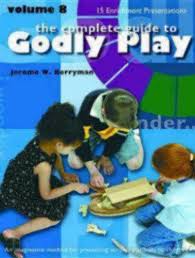
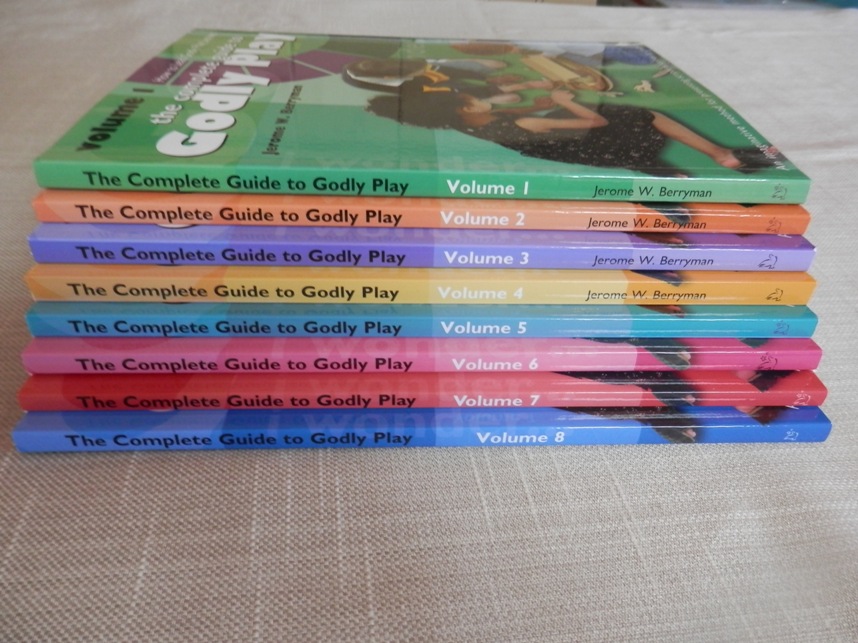 The Complete Guide to Godly Play Volume 8 Jerome W. Berryman (Living the Good News) $29.95 We have sold these unique resources since they first came out, and while this “Montessori” approach to Christian education is beloved by those who use it, it takes a serious and spiritually profound commitment to trust the Spirit’s leading in drawing children to the Biblical text and playfully/prayerfully allowing them to imagine its meaning. You may know that the various books cover various seasons, or themes; this new one includes 15 new presentations. The back cover tells us “it also includes a wealth of capstone insights gleaned from decades of research and practice, as well as an appendix summarizing the foundational literature and describing the entirety of the Godly Play spiral curriculum as it exits today.”
The Complete Guide to Godly Play Volume 8 Jerome W. Berryman (Living the Good News) $29.95 We have sold these unique resources since they first came out, and while this “Montessori” approach to Christian education is beloved by those who use it, it takes a serious and spiritually profound commitment to trust the Spirit’s leading in drawing children to the Biblical text and playfully/prayerfully allowing them to imagine its meaning. You may know that the various books cover various seasons, or themes; this new one includes 15 new presentations. The back cover tells us “it also includes a wealth of capstone insights gleaned from decades of research and practice, as well as an appendix summarizing the foundational literature and describing the entirety of the Godly Play spiral curriculum as it exits today.” Becoming the Gospel: Paul, Participation, and Mission Michael
Becoming the Gospel: Paul, Participation, and Mission Michael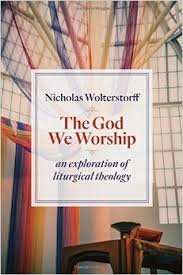 The God We Worship: An Exploration of Liturgical Theology Nicholas
The God We Worship: An Exploration of Liturgical Theology Nicholas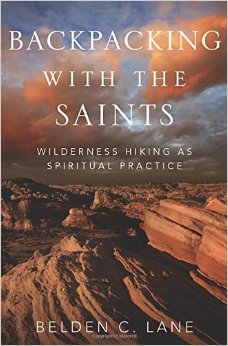 Backpacking with the Saints: Wilderness Hiking as a Spiritual Practice Belden
Backpacking with the Saints: Wilderness Hiking as a Spiritual Practice Belden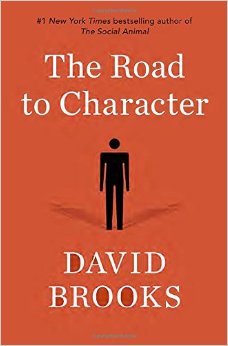 The Road to Character David Brooks (Random House) $28.00
The Road to Character David Brooks (Random House) $28.00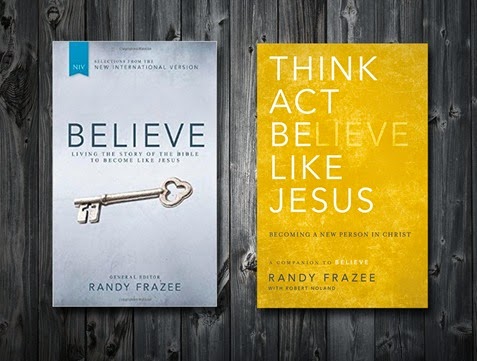 Believe: Living the Story of the Bible to Become Like Jesus
Believe: Living the Story of the Bible to Become Like Jesus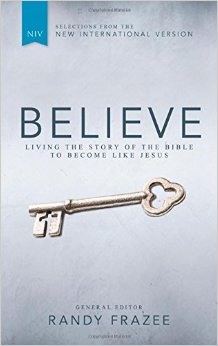 Believe: Living the Story of the Bible is not exactly an abridged NIV Bible, but it is almost entirely Scripture, in a Bible-sized hardback, with the passages and texts arranged around three major
Believe: Living the Story of the Bible is not exactly an abridged NIV Bible, but it is almost entirely Scripture, in a Bible-sized hardback, with the passages and texts arranged around three major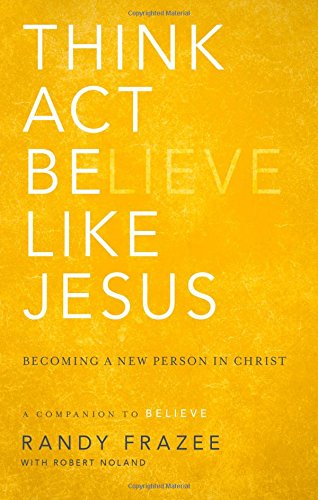 Think, Act, Believe Like Jesus: Becoming a New Person in Christ is
Think, Act, Believe Like Jesus: Becoming a New Person in Christ is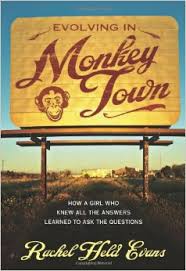
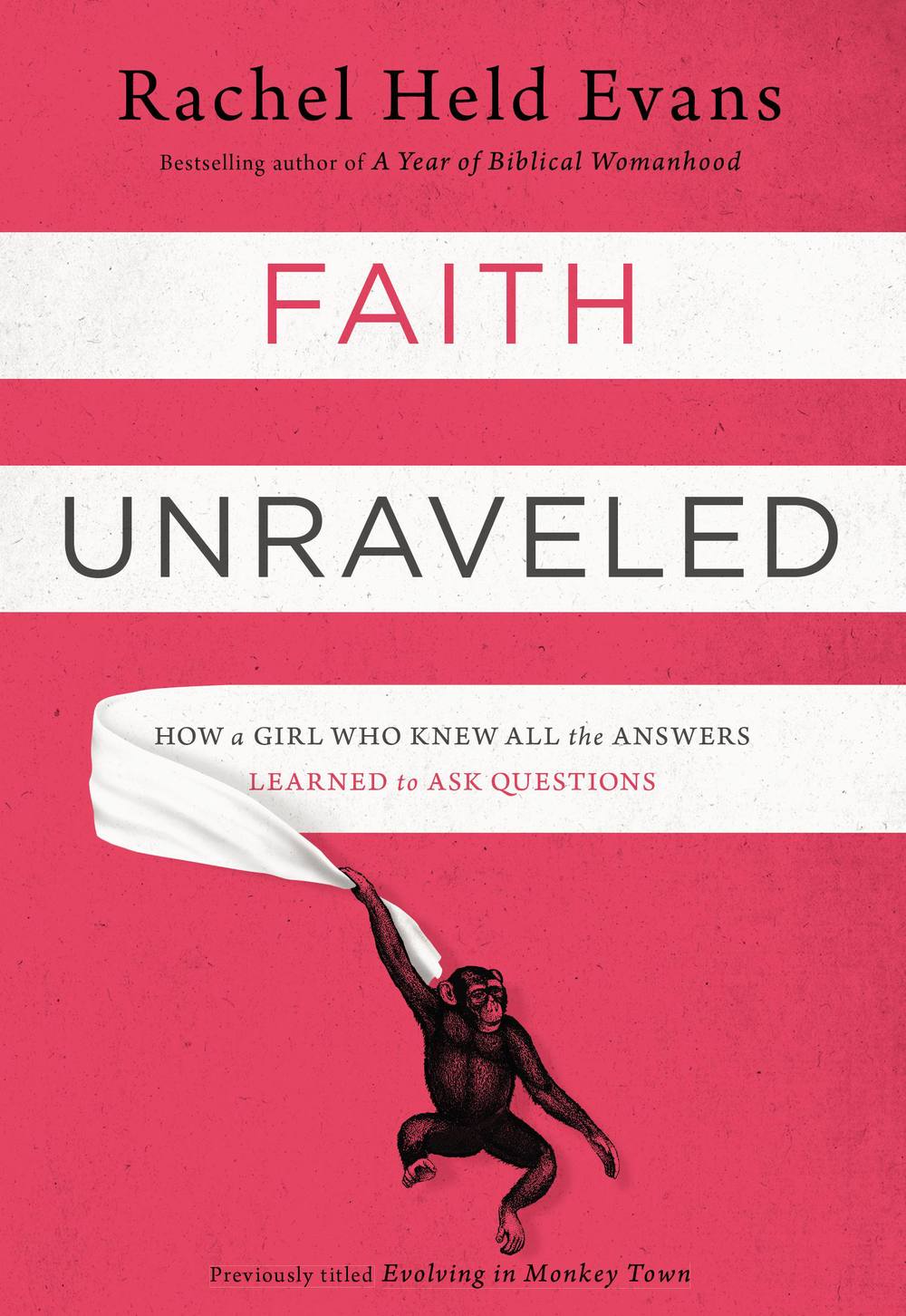
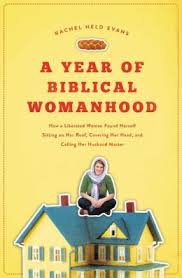

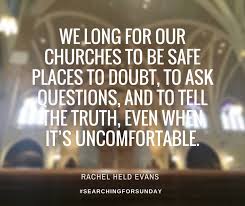 healthy love for the Body of Christ, for the local church, and for the ordinary stuff that gets done in the daily life of faith. It isn’t exactly the same as When Spiritual But Not Religious Is Not Enough: Seeing God in Surprising Places, Even the Church (Jericho Books; $16.00) by UCC pastor Lillian Daniel — which really is a tribute to the small, ordinary, local parish — but I still cannot tell you how grateful I am for this fine work, this voice from the margins, aware of so much wrong with so many expressions of faith, and yet willing to tell us in such beautiful prose and revealing stories, why the church still matters. And that it can still change our lives. This is ecumenical, serious faith, expressed with wonder and grace and captivating prose.
healthy love for the Body of Christ, for the local church, and for the ordinary stuff that gets done in the daily life of faith. It isn’t exactly the same as When Spiritual But Not Religious Is Not Enough: Seeing God in Surprising Places, Even the Church (Jericho Books; $16.00) by UCC pastor Lillian Daniel — which really is a tribute to the small, ordinary, local parish — but I still cannot tell you how grateful I am for this fine work, this voice from the margins, aware of so much wrong with so many expressions of faith, and yet willing to tell us in such beautiful prose and revealing stories, why the church still matters. And that it can still change our lives. This is ecumenical, serious faith, expressed with wonder and grace and captivating prose. Catholics call the seven sacraments. (When I first heard this I wondered, although didn’t think it was likely, that Rachel had become Catholic.) These seven parts, each with several chapters, of sacramental reflections are rich and give the book a structure which is more than just a random collection of her latest thoughts. It is a mature, developed, and highly insightful flow of what might be called spiritual theology. She is doing helpful good work here, besides offering us an entertaining third installment of her ongoing series of memoirs. As she unfolds some of her story – their stint away from church, sleeping in on Sunday, watching Meet the Press and reading the paper (“one New York Times crossword puzzle away from liberal nirvana”) and their eventual return, somewhat sobered – she also tells us what she has learned about the seven sacraments.
Catholics call the seven sacraments. (When I first heard this I wondered, although didn’t think it was likely, that Rachel had become Catholic.) These seven parts, each with several chapters, of sacramental reflections are rich and give the book a structure which is more than just a random collection of her latest thoughts. It is a mature, developed, and highly insightful flow of what might be called spiritual theology. She is doing helpful good work here, besides offering us an entertaining third installment of her ongoing series of memoirs. As she unfolds some of her story – their stint away from church, sleeping in on Sunday, watching Meet the Press and reading the paper (“one New York Times crossword puzzle away from liberal nirvana”) and their eventual return, somewhat sobered – she also tells us what she has learned about the seven sacraments. 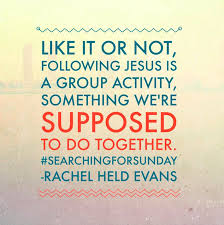
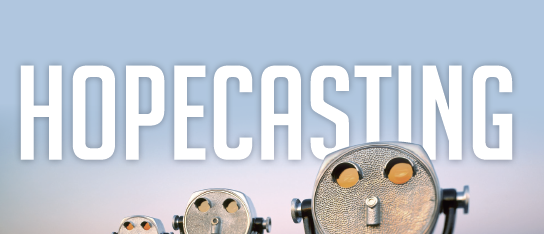
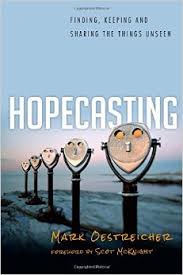 Hopecasting: Finding, Keeping and Sharing the Things Unseen Mark Oestreicher (IVP) $16.00 Oh my, this book (with a nice foreword by Scot McKnight) deserves a long, weighty review. “Why is it that some people are full of hope,” the author asks, “while many of us struggle to get past the snooze alarm?”
Hopecasting: Finding, Keeping and Sharing the Things Unseen Mark Oestreicher (IVP) $16.00 Oh my, this book (with a nice foreword by Scot McKnight) deserves a long, weighty review. “Why is it that some people are full of hope,” the author asks, “while many of us struggle to get past the snooze alarm?” 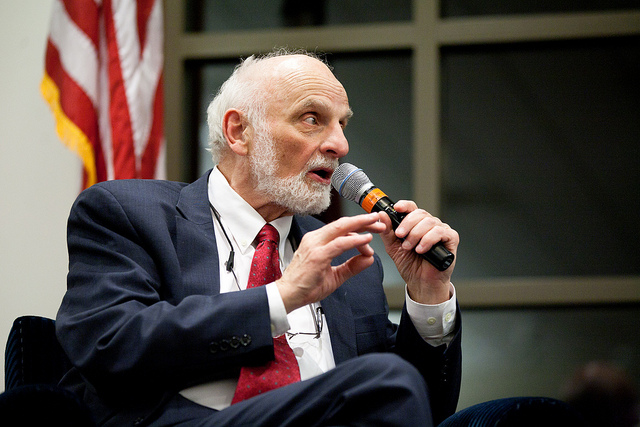
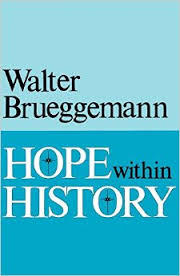

 Orthodox call and response these days. I’m heartened by how many have signed off their emails this week with the creedal reminder, and hope this Eastertide season of the church shapes our imaginations and habits. Nothing against the start of baseball season, of course (we have a Baltimore Sun sportswriter Dan Connolly coming in to the store next month to talk about the Orioles!), but there is something good about rooting ourselves in the ancient story. At the change of each liturgical season I get out Bobby Gross’s great devotional Living the Christian Year: Time to Inhabit the Story of God (IVP; $18.00) and re-read Lauren Winner’s spectacular introduction where she reflects on wanting to be more shaped by the church year than the customs of the American narrative and its secular feast days and calendar revolving around school seasons. What does it mean to be alive to the themes and insights about Jesus, season by season?
Orthodox call and response these days. I’m heartened by how many have signed off their emails this week with the creedal reminder, and hope this Eastertide season of the church shapes our imaginations and habits. Nothing against the start of baseball season, of course (we have a Baltimore Sun sportswriter Dan Connolly coming in to the store next month to talk about the Orioles!), but there is something good about rooting ourselves in the ancient story. At the change of each liturgical season I get out Bobby Gross’s great devotional Living the Christian Year: Time to Inhabit the Story of God (IVP; $18.00) and re-read Lauren Winner’s spectacular introduction where she reflects on wanting to be more shaped by the church year than the customs of the American narrative and its secular feast days and calendar revolving around school seasons. What does it mean to be alive to the themes and insights about Jesus, season by season?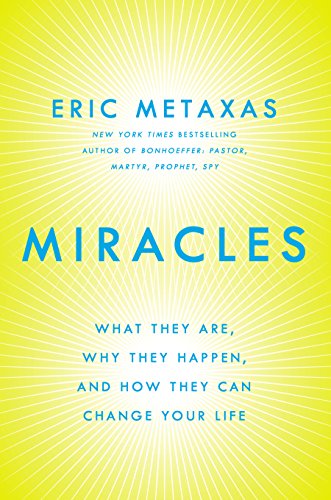 time to think and maybe read about that. He did so in his body, the texts tell us, and I believe it — the modernist lack of imagination among the progressive intelligentsia notwithstanding. If only we could pass out the latest Eric Metaxas book, Miracles (Dutton; $27.95), like loaves and fishes for those hungry for an enchanted universe.
time to think and maybe read about that. He did so in his body, the texts tell us, and I believe it — the modernist lack of imagination among the progressive intelligentsia notwithstanding. If only we could pass out the latest Eric Metaxas book, Miracles (Dutton; $27.95), like loaves and fishes for those hungry for an enchanted universe. 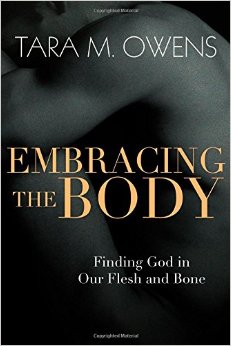 Embracing the Body: Finding God in Our Flesh and Bone Tara M. Owens (IVP/formation) $17.00 This is the third spectacular book published by IVP in the last few years on the nature of the human body, living in our own skins, pondering the deep relationship between our deepest interior lives and our bodies. (We recommend their practical and very spiritually enriching The Life of the Body: Physical Well-Being and Spiritual Formation by Valerie Hess & Lane Arnold and the extraordinary, wonderfully-written What Your Body Knows About God: How We Are Designed to Connect, Serve, and Thrive by Rob Moll. I am sure Debra Hirsch’s soon to be released Redeeming Sex, although a bit more specific, will also wonderful explore the relationship between our bodies and our faith.) I’m glad the acquisition team there are finding these kinds of helpful titles, and releasing them so affordably.
Embracing the Body: Finding God in Our Flesh and Bone Tara M. Owens (IVP/formation) $17.00 This is the third spectacular book published by IVP in the last few years on the nature of the human body, living in our own skins, pondering the deep relationship between our deepest interior lives and our bodies. (We recommend their practical and very spiritually enriching The Life of the Body: Physical Well-Being and Spiritual Formation by Valerie Hess & Lane Arnold and the extraordinary, wonderfully-written What Your Body Knows About God: How We Are Designed to Connect, Serve, and Thrive by Rob Moll. I am sure Debra Hirsch’s soon to be released Redeeming Sex, although a bit more specific, will also wonderful explore the relationship between our bodies and our faith.) I’m glad the acquisition team there are finding these kinds of helpful titles, and releasing them so affordably. 
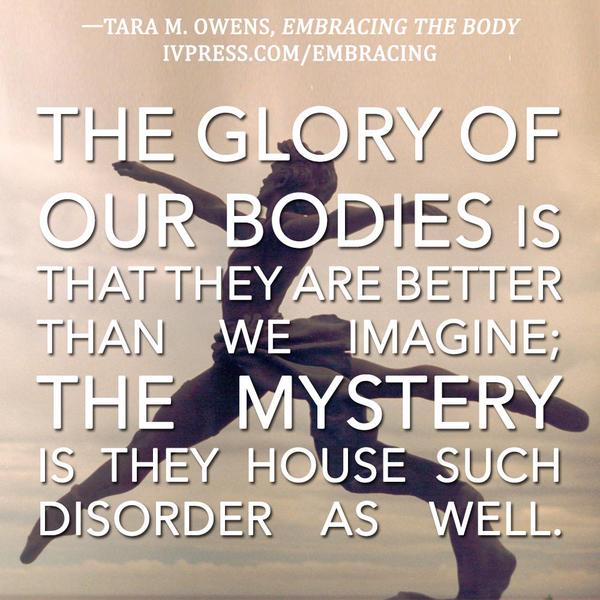 how God’s people in the church -a Body! – might help us with better body images, and how Christ’s redemption may shape and heal our own distorted views and approaches. As you might guess, I loved a chapter called “Sensing God’s Kingdom: Encountering God’s Physical Creation” and highly recommend the chapter on sexuality. (She cites the beautiful book by Lisa Graham McMann, which I often recommend, called Sexuality and Holy Longing: Embracing Intimacy in a Broken World.) There are suggested exercises for reflection at the end of each chapter.
how God’s people in the church -a Body! – might help us with better body images, and how Christ’s redemption may shape and heal our own distorted views and approaches. As you might guess, I loved a chapter called “Sensing God’s Kingdom: Encountering God’s Physical Creation” and highly recommend the chapter on sexuality. (She cites the beautiful book by Lisa Graham McMann, which I often recommend, called Sexuality and Holy Longing: Embracing Intimacy in a Broken World.) There are suggested exercises for reflection at the end of each chapter. 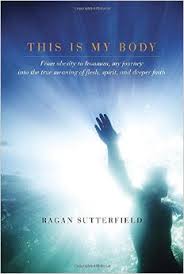 This Is My Body: From Obesity to Ironman, My Journey into the True Meaning of Flesh, Spirit, and Deeper Faith Ragan Sutterfield (Convergent Books) $22.99 It isn’t every day that one sees a mature philosopher write a book about his own body (let alone a triumphant story of becoming an Ironman competitor.) But this – this is smart, exceptionally well-written, captivating, a stimulating blend of memoir and reflection. That Jonathan Wilson-Hartgrove says it is a memoir “that threatens to up-end spiritual writing in the twenty-first century” is significant. This is, truly, an embodied sort of spirituality, a meditation about flesh and weight and sweat and tears and aches and pleasures.
This Is My Body: From Obesity to Ironman, My Journey into the True Meaning of Flesh, Spirit, and Deeper Faith Ragan Sutterfield (Convergent Books) $22.99 It isn’t every day that one sees a mature philosopher write a book about his own body (let alone a triumphant story of becoming an Ironman competitor.) But this – this is smart, exceptionally well-written, captivating, a stimulating blend of memoir and reflection. That Jonathan Wilson-Hartgrove says it is a memoir “that threatens to up-end spiritual writing in the twenty-first century” is significant. This is, truly, an embodied sort of spirituality, a meditation about flesh and weight and sweat and tears and aches and pleasures. 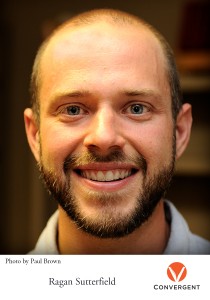 as a body, as he awakened to his body, to his own body in college. He became obese, and has chapters telling how his body was lonely, broken, fulfilled… you’ve been there, no doubt. Interspersed with these auto-biographical ruminations are episodes from his taking up Ironman training as a spiritual discipline. I usually have little interest in reading about these kinds of hard exercise regimens or extreme sports stories (although we do have a book called Slowspoke about a guy riding a unicycle across the country) but found these parts very interesting. Beyond that, they were inspiring, and one more way into this conversation that God cares about this world, that there are, as Bruce Cockburn has sung, “rumours of glory” and that Christ’s own resurrection helps us know in the deepest sense, the promise of the redemption of all things, including our bodies. Did I mention that one of Mr. Sutterfield’s chapters is called “My Resurrected Body”?
as a body, as he awakened to his body, to his own body in college. He became obese, and has chapters telling how his body was lonely, broken, fulfilled… you’ve been there, no doubt. Interspersed with these auto-biographical ruminations are episodes from his taking up Ironman training as a spiritual discipline. I usually have little interest in reading about these kinds of hard exercise regimens or extreme sports stories (although we do have a book called Slowspoke about a guy riding a unicycle across the country) but found these parts very interesting. Beyond that, they were inspiring, and one more way into this conversation that God cares about this world, that there are, as Bruce Cockburn has sung, “rumours of glory” and that Christ’s own resurrection helps us know in the deepest sense, the promise of the redemption of all things, including our bodies. Did I mention that one of Mr. Sutterfield’s chapters is called “My Resurrected Body”? 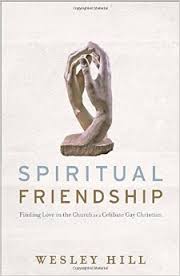 Spiritual Friendship: Finding Love in the Church as a Celibate Gay Christian Wesley Hill (Brazos Press) $14.99 This book deserves its own longer review, and I am afraid I cannot do it justice here. It is one of the most important books of our time, vital, important, rare, wise, exceptional. It is exactly about our embodiedness, yes, even about the redemption of our sexuality. It is beautifully written, exquisite at times, and more candid then one might expect in an evangelical Christian book. We are proud to carry it, and eager to commend it to one and all.
Spiritual Friendship: Finding Love in the Church as a Celibate Gay Christian Wesley Hill (Brazos Press) $14.99 This book deserves its own longer review, and I am afraid I cannot do it justice here. It is one of the most important books of our time, vital, important, rare, wise, exceptional. It is exactly about our embodiedness, yes, even about the redemption of our sexuality. It is beautifully written, exquisite at times, and more candid then one might expect in an evangelical Christian book. We are proud to carry it, and eager to commend it to one and all.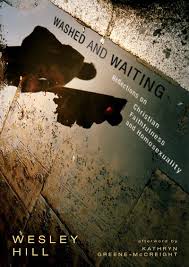 expectation of God re-orienting his own desires for same sex intimacy. Some on the progressive side of things have lamented his prissy fidelity to heterosexual norms and some in the fundamentalist camps have wished for less candor from the brother. (An unashamed gay Christian? Yikes!) We believe that book to be a watershed and exceptionally helpful for those wanting a third way between the extremes. Agree or not, it is, as they say, what it is: a testimonial witness of a very thoughtful, young evangelical leader ruminating on his body, on the redemption of all things, and his hope as he waits for the new earth.
expectation of God re-orienting his own desires for same sex intimacy. Some on the progressive side of things have lamented his prissy fidelity to heterosexual norms and some in the fundamentalist camps have wished for less candor from the brother. (An unashamed gay Christian? Yikes!) We believe that book to be a watershed and exceptionally helpful for those wanting a third way between the extremes. Agree or not, it is, as they say, what it is: a testimonial witness of a very thoughtful, young evangelical leader ruminating on his body, on the redemption of all things, and his hope as he waits for the new earth.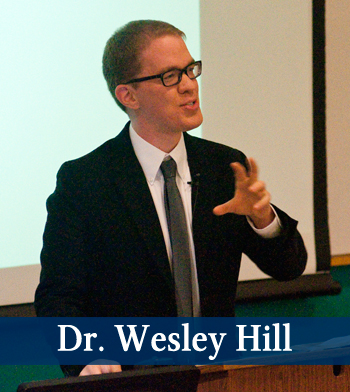 physicality — I suspect this book, which I have only started, will talk about the value of human embrace, of touch. Just this week in church a single friend mentioned to me that she and others she knows are “touched starved.” She was not hinting at anything illicit, of course, but only admitting that single people, widows and widowers, and all sorts of folks need human touch. Let us even leave aside the question of whether we all need something erotic in our lives, sensual pleasures. There is no doubt that we all need touch. I think that Hill writes about this, and enters these frank matters out of both his own personal experience (which he mentions in Washed and Waiting) and from his meticulous, rich, theological studies.
physicality — I suspect this book, which I have only started, will talk about the value of human embrace, of touch. Just this week in church a single friend mentioned to me that she and others she knows are “touched starved.” She was not hinting at anything illicit, of course, but only admitting that single people, widows and widowers, and all sorts of folks need human touch. Let us even leave aside the question of whether we all need something erotic in our lives, sensual pleasures. There is no doubt that we all need touch. I think that Hill writes about this, and enters these frank matters out of both his own personal experience (which he mentions in Washed and Waiting) and from his meticulous, rich, theological studies.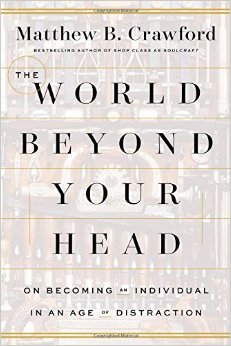 The World Beyond Your Head: On Becoming an Individual in an Age of Distraction Matthew B. Crawford (FSG) $26.00 I announced this notable book on this prestigious publisher in the last post, naming 12 of our favorite books that released last month. I have only dipped in to this – the booksellers joy and frustration – but I have talked to one of our most astute customers, a serious and delightful reader, who assures me it is one of the better books of the year. Crawford, as you surely know (since you read my post earlier this week – ahem!) wrote the much-discussed Shop Class as Soulcraft a few years ago. His story in that rich and learned work, is fantastic. He grew weary of his abstract and seemingly pointless work as a scholar in a think-tank and found new joy and meaning in a motorcycle repair shop he opened. As one well-schooled in the liberal arts (and still involved in the academy as a senior fellow at the University of Virginia’s Institute for Advanced Studies of Culture – run by James Davison Hunter) he can ponder the intricacies and nuances of cultural shifts with the best of them. (Ahh, but can other cultural critics fabricate components for custom motorcycles?) His call to re-instate shop class, for reasons both practical and soulful, is breathtaking.
The World Beyond Your Head: On Becoming an Individual in an Age of Distraction Matthew B. Crawford (FSG) $26.00 I announced this notable book on this prestigious publisher in the last post, naming 12 of our favorite books that released last month. I have only dipped in to this – the booksellers joy and frustration – but I have talked to one of our most astute customers, a serious and delightful reader, who assures me it is one of the better books of the year. Crawford, as you surely know (since you read my post earlier this week – ahem!) wrote the much-discussed Shop Class as Soulcraft a few years ago. His story in that rich and learned work, is fantastic. He grew weary of his abstract and seemingly pointless work as a scholar in a think-tank and found new joy and meaning in a motorcycle repair shop he opened. As one well-schooled in the liberal arts (and still involved in the academy as a senior fellow at the University of Virginia’s Institute for Advanced Studies of Culture – run by James Davison Hunter) he can ponder the intricacies and nuances of cultural shifts with the best of them. (Ahh, but can other cultural critics fabricate components for custom motorcycles?) His call to re-instate shop class, for reasons both practical and soulful, is breathtaking. extols practices and craft, he explains how the brain works (yes, neurology figures in to this new volume) and he invites us again to resist Gnosticism. That is the theological heresy, of course, that devalued the physical world, hating the body as Plato did. (I still cringe when a congregation sings “I’ll Fly Away” with its non-biblical, Platonic stuff about this world of God’s being a “prison.”) Crawford, by focusing on our literal, embodied labor and skills, helps us heady types recall the places we live and the ways we work.
extols practices and craft, he explains how the brain works (yes, neurology figures in to this new volume) and he invites us again to resist Gnosticism. That is the theological heresy, of course, that devalued the physical world, hating the body as Plato did. (I still cringe when a congregation sings “I’ll Fly Away” with its non-biblical, Platonic stuff about this world of God’s being a “prison.”) Crawford, by focusing on our literal, embodied labor and skills, helps us heady types recall the places we live and the ways we work.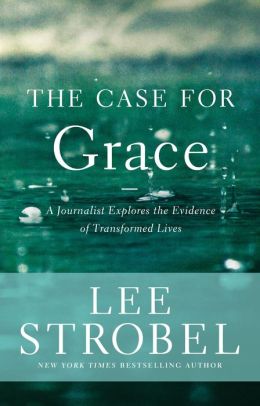 The Case for Grace: A Journalist Explores the Evident of Transformed Lives Lee Strobel (Zondervan) $22.99 I bet that not a few of us heard sermons this week about how the message of Easter can change our lives. Maybe you heard a good story or two of real people whose lives were transformed by the gospel. If you, like most people, love those kinds of stories – or you want to share a book with somebody who needs those kinds of stories – this is the book for you. Not unlike his other useful anthologies (Case for Christ, Case for Faith, Case for a Creator) Strobel uses his considerable journalistic skill and his own lively verve to tells the tales of those who met Christ, came to understand grace, were set free by free-flowing mercy. What great and intriguing and fabulous stories. Strobel is more candid here about his own journey from atheism to follower of Jesus. There is an extensive study guide in the back, too, making this great for book clubs. This is Strobel’s most personal and practice book yet. Watch Lee talk about it in this very nice
The Case for Grace: A Journalist Explores the Evident of Transformed Lives Lee Strobel (Zondervan) $22.99 I bet that not a few of us heard sermons this week about how the message of Easter can change our lives. Maybe you heard a good story or two of real people whose lives were transformed by the gospel. If you, like most people, love those kinds of stories – or you want to share a book with somebody who needs those kinds of stories – this is the book for you. Not unlike his other useful anthologies (Case for Christ, Case for Faith, Case for a Creator) Strobel uses his considerable journalistic skill and his own lively verve to tells the tales of those who met Christ, came to understand grace, were set free by free-flowing mercy. What great and intriguing and fabulous stories. Strobel is more candid here about his own journey from atheism to follower of Jesus. There is an extensive study guide in the back, too, making this great for book clubs. This is Strobel’s most personal and practice book yet. Watch Lee talk about it in this very nice 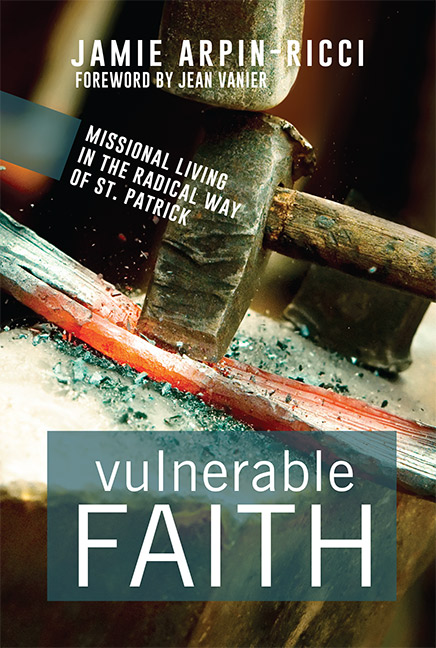 Vulnerable Faith: Missional Living in the Radical Way of St. Patrick Jamie Arpin-Ricci (Paraclete Press) $16.99 Like most of the titles in this list, this fine book deserves a much better review than I can offer here in these brief annotations. Trust me, here: Jamie is the real deal; an experienced and wise missional pastor of an inner city faith community in Winnipeg called Little Flowers who is always worth listening to. He has spent decades in urban ministry, and has written widely – good, if provocative and challenging, stuff on grace and discipleship, community and servanthood, prayer and public life.
Vulnerable Faith: Missional Living in the Radical Way of St. Patrick Jamie Arpin-Ricci (Paraclete Press) $16.99 Like most of the titles in this list, this fine book deserves a much better review than I can offer here in these brief annotations. Trust me, here: Jamie is the real deal; an experienced and wise missional pastor of an inner city faith community in Winnipeg called Little Flowers who is always worth listening to. He has spent decades in urban ministry, and has written widely – good, if provocative and challenging, stuff on grace and discipleship, community and servanthood, prayer and public life. 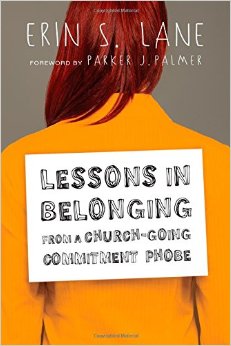 Lessons in Belonging From a Church-Going Commitment Phobe Erin Lane (IVP/cresendo) $16.00 One of the best written paperbacks of the year, this is a truly splendid, very honest, often funny, really enjoyable and profound rumination on commitment and belonging to a local church. I’m telling you, you’ve not read a book on community or parish life like this before! If you are young and longing for community but not so sure of the local congregation, you have to read this. If you are an older reader, wondering why young adults may not be as active in church as you may wish, and want a wonderful and helpful glimpse into their lives and faith, this story is a must. Ms Lane has a degree from Duke Divinity School, to make matters more sticky, her husband is a pastor. She knows her way around good sentences and storytelling, too; she helped edit an anthology we love of Christian women telling their stories called Talking Taboo. Lessons in Belonging written by a “commitment phobe” is very highly recommended.
Lessons in Belonging From a Church-Going Commitment Phobe Erin Lane (IVP/cresendo) $16.00 One of the best written paperbacks of the year, this is a truly splendid, very honest, often funny, really enjoyable and profound rumination on commitment and belonging to a local church. I’m telling you, you’ve not read a book on community or parish life like this before! If you are young and longing for community but not so sure of the local congregation, you have to read this. If you are an older reader, wondering why young adults may not be as active in church as you may wish, and want a wonderful and helpful glimpse into their lives and faith, this story is a must. Ms Lane has a degree from Duke Divinity School, to make matters more sticky, her husband is a pastor. She knows her way around good sentences and storytelling, too; she helped edit an anthology we love of Christian women telling their stories called Talking Taboo. Lessons in Belonging written by a “commitment phobe” is very highly recommended. Wearing God: Clothing, Laughter, Fire, and Other Overlooked Ways of Meeting God Lauren F. Winner (HarperOne) $24.99 This is, for me, personally, the most anticipated book of the season, and I almost regret that it hit bookstores the week before Easter. I have not yet more than cracked the cover and glanced at the table of contents and footnotes I (and, okay, the acknowledgements, because, well, that’s what I always do to get a feel for whom and what the author is grateful.) This is not the first book that explores lesser known Biblical images for God, but it will most likely be the most beautifully written, the most inspiring, the most enjoyable to read, and significant to take to heart. Here is what it says on the back:
Wearing God: Clothing, Laughter, Fire, and Other Overlooked Ways of Meeting God Lauren F. Winner (HarperOne) $24.99 This is, for me, personally, the most anticipated book of the season, and I almost regret that it hit bookstores the week before Easter. I have not yet more than cracked the cover and glanced at the table of contents and footnotes I (and, okay, the acknowledgements, because, well, that’s what I always do to get a feel for whom and what the author is grateful.) This is not the first book that explores lesser known Biblical images for God, but it will most likely be the most beautifully written, the most inspiring, the most enjoyable to read, and significant to take to heart. Here is what it says on the back: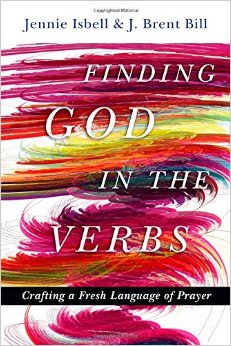 Finding God in the Verbs: Crafting a Fresh Language of Prayer Jennie Isbell & J. Brent Bill (IVP/formation) $16.00 I think it is kind of funny to see the zesty swirls of color on this busy cover, realizing the authors are both Quakers. But maybe Friends are not as you imagine, and energy captured here is just right. This new handbook is not that quiet or still, not even all that sober, but is fresh and lively and full of mystery and energy; it’s about verbs, you know. Language, they remind us, shapes and guides us, even our understanding of our encounters with God. As Nathan Foster notes of it, Finding God in the Verbs “ultimately unlocks our hearts into a deeper, more intimate relationship of joy and ease with God.” A book that offers “ease with God.” Wow. (Now that sounds Quaker, eh?) These two writers and spiritual directors obviously have spent some time in some deep waters, and they are obviously lovers of words, of good language. This book of exercises can help you deepen your love, too, for prayer and words and, finally, for God.
Finding God in the Verbs: Crafting a Fresh Language of Prayer Jennie Isbell & J. Brent Bill (IVP/formation) $16.00 I think it is kind of funny to see the zesty swirls of color on this busy cover, realizing the authors are both Quakers. But maybe Friends are not as you imagine, and energy captured here is just right. This new handbook is not that quiet or still, not even all that sober, but is fresh and lively and full of mystery and energy; it’s about verbs, you know. Language, they remind us, shapes and guides us, even our understanding of our encounters with God. As Nathan Foster notes of it, Finding God in the Verbs “ultimately unlocks our hearts into a deeper, more intimate relationship of joy and ease with God.” A book that offers “ease with God.” Wow. (Now that sounds Quaker, eh?) These two writers and spiritual directors obviously have spent some time in some deep waters, and they are obviously lovers of words, of good language. This book of exercises can help you deepen your love, too, for prayer and words and, finally, for God.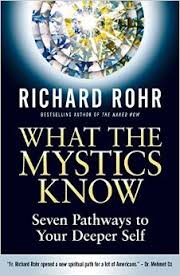 What the Mystics Know: Seven Pathways to Your Deeper Self Richard Rohr (Crossroads) $19.95 Anyone who keeps up with the most popular spiritual writers knows Fr. Richard Rohr, a lively and socially engaged Franciscan. In this new hardback, he invites us to central values that guide the monastic path, offering, as he has in recent works, not only practices to know God more deeply, but ways to know one’s own self with more holy awareness. One of the interesting things about this handsome book is the color on the inside (even the ink color) and the full color pictures illuminating the text. This might remind readers of good on-line text or a classy magazine, with useful art and color and photographs. Maybe these seven pathways were given as talks and these were the PowerPoint slides that enhanced it. However it developed it is a bit unique, and many will love this guy into the mystical path.
What the Mystics Know: Seven Pathways to Your Deeper Self Richard Rohr (Crossroads) $19.95 Anyone who keeps up with the most popular spiritual writers knows Fr. Richard Rohr, a lively and socially engaged Franciscan. In this new hardback, he invites us to central values that guide the monastic path, offering, as he has in recent works, not only practices to know God more deeply, but ways to know one’s own self with more holy awareness. One of the interesting things about this handsome book is the color on the inside (even the ink color) and the full color pictures illuminating the text. This might remind readers of good on-line text or a classy magazine, with useful art and color and photographs. Maybe these seven pathways were given as talks and these were the PowerPoint slides that enhanced it. However it developed it is a bit unique, and many will love this guy into the mystical path.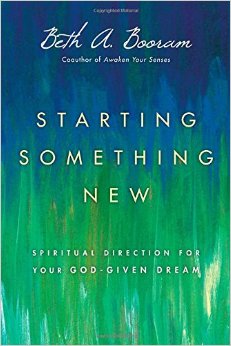 Starting Something New: Spiritual Direction for Your God Given Dream Beth A. Booram (IVP/formation) $16.00 I have often recommended Booram’s lovely The Wide Open Spaces of God to those who are interested in experiential education and finding ways to relate faith formation and place; her book of meditation based on many different paintings of Jesus (Picturing the Face of Jesus) is a sleeper that should be better known. The fabulous book Awakening Your Senses is packed with exercises and suggestions for using our senses to experience God and God’s creation. This new one is a wonderful resource which, as Randy Reese puts it, “offers both inspiration and wisdom through her own story and the stories of those who trusted the Spirit’s stirring to follow after their own God-given dreams. Whether you are seeking direction or providing it for others, Starting Something New will help set people on a path they were meant to follow after.” Here is what it says on the back cover: “Do you long to change your lifestyle or vocation, or to start a new business or nonprofit ministry? Do you find yourself wondering “How do I know for sure that this dream is from God and for me? And what in the world should I do?” This really is a book to help guide you through the spiritual process of defining and acting on the idea stirring within you.
Starting Something New: Spiritual Direction for Your God Given Dream Beth A. Booram (IVP/formation) $16.00 I have often recommended Booram’s lovely The Wide Open Spaces of God to those who are interested in experiential education and finding ways to relate faith formation and place; her book of meditation based on many different paintings of Jesus (Picturing the Face of Jesus) is a sleeper that should be better known. The fabulous book Awakening Your Senses is packed with exercises and suggestions for using our senses to experience God and God’s creation. This new one is a wonderful resource which, as Randy Reese puts it, “offers both inspiration and wisdom through her own story and the stories of those who trusted the Spirit’s stirring to follow after their own God-given dreams. Whether you are seeking direction or providing it for others, Starting Something New will help set people on a path they were meant to follow after.” Here is what it says on the back cover: “Do you long to change your lifestyle or vocation, or to start a new business or nonprofit ministry? Do you find yourself wondering “How do I know for sure that this dream is from God and for me? And what in the world should I do?” This really is a book to help guide you through the spiritual process of defining and acting on the idea stirring within you.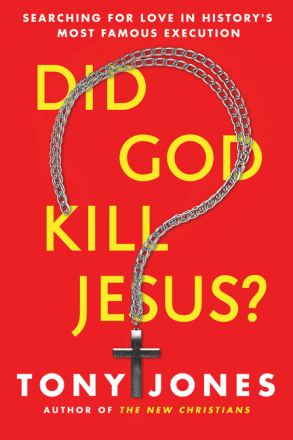 Did God Kill Jesus? Searching for Love in History’s Most Famous Execution Tony Jones (HarperOne) $26.99 I suppose you are aware that there has been a lively (and at times ugly) debate in mostly evangelical (or emerging post-evangelical) circles, about the nature of the atonement, what the cross is about, and the significance of Christ’s death. I have read many of these recent books – defending classic penal substitutionary views of atonement and justification, looking at orthodox but fresh new perspectives, and even some that are what conventional believers who think to be a bit “out there.” There are good books that survey various schools of thought, and there are scholars who are irenic and balanced, some who are iconoclastic and deconstructive. This small announcement is not the place to further describe this robust conversation, other than to say that I have found Tony Jones’s book to be one of the most interesting, stimulating, approachable and provocative books on this topic I have yet read. He covers a lot of ground, and explains things with wit and (most of the time) fairness. From the honest explanations of why some of Bible stories and teaching (not to mention later theological formulations) are disturbing to some folks, to how various models or approaches were developed, this really does offer hope and new ways of holding all of this together for those who are frustrated with conventional single-minded teaching that explains the death of Christ solely in punitive ways. Although Jones is known as a provocative writer, this isn’t some fringe, weirdo topic: we all should reflect, regularly, how best to understand and explain this central core of Christian faith. And Tony is right to ask what kind of God is behind each model of atonement, and what kind of fruit our theological explanations bears (he calls it “the smell test.”) This is vital stuff. Adam Hamilton says “Every Christian should read this book” and Nadia Bolz-Weber (an edgy-looking emergent Lutheran pastor who preaches pretty standard law-gospel messages week by week) says “I will be honestly referring people to it for decades to come. It’s that important.”
Did God Kill Jesus? Searching for Love in History’s Most Famous Execution Tony Jones (HarperOne) $26.99 I suppose you are aware that there has been a lively (and at times ugly) debate in mostly evangelical (or emerging post-evangelical) circles, about the nature of the atonement, what the cross is about, and the significance of Christ’s death. I have read many of these recent books – defending classic penal substitutionary views of atonement and justification, looking at orthodox but fresh new perspectives, and even some that are what conventional believers who think to be a bit “out there.” There are good books that survey various schools of thought, and there are scholars who are irenic and balanced, some who are iconoclastic and deconstructive. This small announcement is not the place to further describe this robust conversation, other than to say that I have found Tony Jones’s book to be one of the most interesting, stimulating, approachable and provocative books on this topic I have yet read. He covers a lot of ground, and explains things with wit and (most of the time) fairness. From the honest explanations of why some of Bible stories and teaching (not to mention later theological formulations) are disturbing to some folks, to how various models or approaches were developed, this really does offer hope and new ways of holding all of this together for those who are frustrated with conventional single-minded teaching that explains the death of Christ solely in punitive ways. Although Jones is known as a provocative writer, this isn’t some fringe, weirdo topic: we all should reflect, regularly, how best to understand and explain this central core of Christian faith. And Tony is right to ask what kind of God is behind each model of atonement, and what kind of fruit our theological explanations bears (he calls it “the smell test.”) This is vital stuff. Adam Hamilton says “Every Christian should read this book” and Nadia Bolz-Weber (an edgy-looking emergent Lutheran pastor who preaches pretty standard law-gospel messages week by week) says “I will be honestly referring people to it for decades to come. It’s that important.” 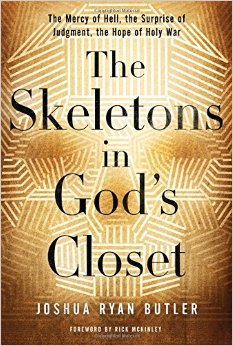 The Skeletons in God’s Closet: The Mercy of Hell, the Surprise of Judgment, the Hope of Holy War Joshua Ryan Butler (Thomas Nelson)$ 15.99 This 350 page book was obviously a labor of love by a very thoughtful, aware and hip, young pastor. (Joshua – a reader of BookNotes, I suppose I might add – is a pastor of outreach at the very creative Imago Dei Community in Portland. Rick McKinley, whose books I love, is from there, and wrote a nice foreword.) As one who oversees the churches considerable activism around foster care, against trafficking, homelessness and global issues like HIV-support and clean water projects, Butler knows, more than most of us, what it means to long for God’s redemption of the fallen creation. He understands the hope of the gospel and offers here what Scot McKnight describes as “relief and joy.” Let’s face it, though: for many of us it does seem like God has some skeletons in the closest – some even think God appears like a moral monster, a sadistic torturer, even, especially when thinking about hell or the violence in the Bible. I think Butler has given us one of the better books about all this, sensitive, honest, creative and fresh, energetic. He doesn’t stretch for untenable, obscure answers, but yet willing to work out the implications of our “texts of terror” with the Bible’s testimony that God is good, and working to heal the fabric of this world. Can hell be merciful? Can judgment be surprisingly good? I think this is a fine contribution, and will thrill those who appreciate Biblical scholars such as Oliver and Joan O’Donovan, N.T. Wright, Chris Wright, John Goldingay, Leslie Newbigin, Miroslov Volf.
The Skeletons in God’s Closet: The Mercy of Hell, the Surprise of Judgment, the Hope of Holy War Joshua Ryan Butler (Thomas Nelson)$ 15.99 This 350 page book was obviously a labor of love by a very thoughtful, aware and hip, young pastor. (Joshua – a reader of BookNotes, I suppose I might add – is a pastor of outreach at the very creative Imago Dei Community in Portland. Rick McKinley, whose books I love, is from there, and wrote a nice foreword.) As one who oversees the churches considerable activism around foster care, against trafficking, homelessness and global issues like HIV-support and clean water projects, Butler knows, more than most of us, what it means to long for God’s redemption of the fallen creation. He understands the hope of the gospel and offers here what Scot McKnight describes as “relief and joy.” Let’s face it, though: for many of us it does seem like God has some skeletons in the closest – some even think God appears like a moral monster, a sadistic torturer, even, especially when thinking about hell or the violence in the Bible. I think Butler has given us one of the better books about all this, sensitive, honest, creative and fresh, energetic. He doesn’t stretch for untenable, obscure answers, but yet willing to work out the implications of our “texts of terror” with the Bible’s testimony that God is good, and working to heal the fabric of this world. Can hell be merciful? Can judgment be surprisingly good? I think this is a fine contribution, and will thrill those who appreciate Biblical scholars such as Oliver and Joan O’Donovan, N.T. Wright, Chris Wright, John Goldingay, Leslie Newbigin, Miroslov Volf.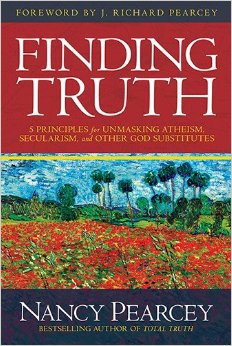 Finding Truth Nancy Pearcey (David C. Cook) $22.99 A few who know me know that one of the great influences in my life in the 1970s was a Dutch Kuyperian professor and activist named Peter Steen who taught college students to analyze Western society by discerning the main “spirits of the age” and the idols that formed the main worldviews of the secularized culture committed mostly to capitalism and progress. Drawing on Dutch philosopher Herman Dooyeweerd, Steen taught us (including some in the CCO and those who founded the Jubilee conference) this conceptual tool that was somewhat akin, if a bit deeper, to the cultural and philosophical apologetic of Francis Schaeffer.) We learned that many of the cultural shifts of the middle of the 20th century (most bluntly, a reductionist rationalism, mostly on the right and bohemian romanticism, mostly on the left) have their most immediate roots in the eighteenth Enlightenment, even the French Revolution (even though Steen insisted that the dualisms and wrong-headed ways of seeing life and doing education began with the ancient Greek philosophers, and in the early church’s accommodation to pagan Greek thought.)
Finding Truth Nancy Pearcey (David C. Cook) $22.99 A few who know me know that one of the great influences in my life in the 1970s was a Dutch Kuyperian professor and activist named Peter Steen who taught college students to analyze Western society by discerning the main “spirits of the age” and the idols that formed the main worldviews of the secularized culture committed mostly to capitalism and progress. Drawing on Dutch philosopher Herman Dooyeweerd, Steen taught us (including some in the CCO and those who founded the Jubilee conference) this conceptual tool that was somewhat akin, if a bit deeper, to the cultural and philosophical apologetic of Francis Schaeffer.) We learned that many of the cultural shifts of the middle of the 20th century (most bluntly, a reductionist rationalism, mostly on the right and bohemian romanticism, mostly on the left) have their most immediate roots in the eighteenth Enlightenment, even the French Revolution (even though Steen insisted that the dualisms and wrong-headed ways of seeing life and doing education began with the ancient Greek philosophers, and in the early church’s accommodation to pagan Greek thought.) 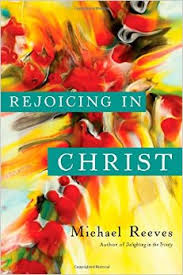 Rejoicing in Christ
Rejoicing in Christ 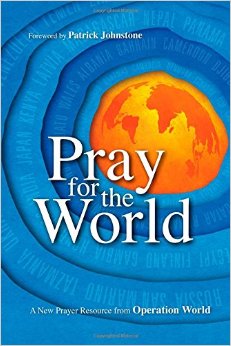 Pray for the World: A New Prayer Resource from Operation World Foreword by Patrick Johnstone (IVP/Operation World) $15.00 Many know, and some use, the spectacular prayer guide which offers details about and need to pray about for every country on Earth. Operation World remains an essential tool, but it is, in a few cases, a bit dated, now, and is, admittedly, chock full of data. This up-to-date new volume emerged from the Operation World research teams who asked Christian leaders in every country one key question:
Pray for the World: A New Prayer Resource from Operation World Foreword by Patrick Johnstone (IVP/Operation World) $15.00 Many know, and some use, the spectacular prayer guide which offers details about and need to pray about for every country on Earth. Operation World remains an essential tool, but it is, in a few cases, a bit dated, now, and is, admittedly, chock full of data. This up-to-date new volume emerged from the Operation World research teams who asked Christian leaders in every country one key question: